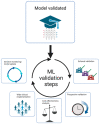Artificial Intelligence in Renal Cell Carcinoma Histopathology: Current Applications and Future Perspectives
- PMID: 37443687
- PMCID: PMC10340141
- DOI: 10.3390/diagnostics13132294
Artificial Intelligence in Renal Cell Carcinoma Histopathology: Current Applications and Future Perspectives
Abstract
Renal cell carcinoma (RCC) is characterized by its diverse histopathological features, which pose possible challenges to accurate diagnosis and prognosis. A comprehensive literature review was conducted to explore recent advancements in the field of artificial intelligence (AI) in RCC pathology. The aim of this paper is to assess whether these advancements hold promise in improving the precision, efficiency, and objectivity of histopathological analysis for RCC, while also reducing costs and interobserver variability and potentially alleviating the labor and time burden experienced by pathologists. The reviewed AI-powered approaches demonstrate effective identification and classification abilities regarding several histopathological features associated with RCC, facilitating accurate diagnosis, grading, and prognosis prediction and enabling precise and reliable assessments. Nevertheless, implementing AI in renal cell carcinoma generates challenges concerning standardization, generalizability, benchmarking performance, and integration of data into clinical workflows. Developing methodologies that enable pathologists to interpret AI decisions accurately is imperative. Moreover, establishing more robust and standardized validation workflows is crucial to instill confidence in AI-powered systems' outcomes. These efforts are vital for advancing current state-of-the-art practices and enhancing patient care in the future.
Keywords: artificial intelligence; kidney cancer; pathology; renal cell carcinoma.
Conflict of interest statement
The authors confirm that there are no conflict of interest with any financial organization regarding the material discussed in this manuscript.
Figures


References
-
- Garfield K., LaGrange C.A. Renal Cell Cancer. StatPearls; Treasure Island, FL, USA: 2022. - PubMed
-
- Cimadamore A., Caliò A., Marandino L., Marletta S., Franzese C., Schips L., Amparore D., Bertolo R., Muselaers S., Erdem S., et al. Hot topics in renal cancer pathology: Implications for clinical management. Expert Rev. Anticancer. Ther. 2022;22:1275–1287. doi: 10.1080/14737140.2022.2145952. - DOI - PubMed
Publication types
LinkOut - more resources
Full Text Sources

